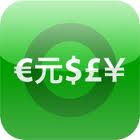Apps - which ones are actually useful?
I'm going to go ahead and assume most people who read this blog have one of those too-smart-for-us-steve-jobs invented devices called a smartphone (samsung users, that includes you. That Galaxy S3 you are holding wouldn't have existed if it wasn't for Jobs).
With that in mind here is my list of apps that I actually found useful, the links are all to the Apple store, but they do exist in the Android store. Why the descriptive of "actually found useful"? Because there are a lot of apps in the universe that claim to be useful but really, when the going gets tough, are just pointless. They either eat way too much of that expensive data you are paying for at usury rates, or they take too long on the wifi, or they just have no real point when the rubber hits the road. With these caveats in mind, my list is very short:
Best App for Currencies Rates: Remembering the US to 'fill-in-the-blank' exchange rate is all easy and dandy when you just have to remember just one or two rates (eg: GBP and EUR) but it gets tricky when you have to remember the rate between the USD and the Kit, the Riel, the Kyat, the Kroner, the Swiss France etc. I think you get my point. Introducing Currency . Trust me its great.
Best App for when You are Lost: Sorry apple, Google wins this one. Google Maps is hands down the best mapping software out there. Use it and don't bother downloading any other map app. (Its most probably already on your phone).
Best App(s) for Memories: The obvious first one here is the photo function on your phone. Use it. Don't be embarrassed to take pictures in silly places, especially in Asia 'cause trust me you wont be the only one taking silly pictures. You think you'll remember everything - you wont.
The second, but possibly more useful, app is Day One . You use this app to record your daily events - it is completely private, in fact there is no actual sharing function. Entries can be GPS marked and dated with a picture you took during the day and you can write as much or as little as you want. It is basically the best digital, private, journaling app available. Useful for the trip of a lifetime.
Best App(s) for Trip Planning: I've already gone on a long discourse of the value of TripAdvisor, but here I'll recommend the app. It doesn't have as much functionality as the website. You can make a search for just "B&B" or "Boutique Hotels" but it does help give you a good overview of what is available in your next destination.
The second favorite is Kayak. This is the app I've used to plan, price, and sometimes book basically all of my flights during this trip. The app has proven, wherever I've been, to be the most comprehensive list of available flights and with one or two exceptions, has always given me the cheapest options. Great functionality, great interface. Highly recommended.
Other sites/apps I've used for booking/planning: Booking, Agoda.






